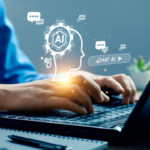
Turning Data Into Dollars: AI’s Impact on Marketing Efficiency
November 8, 2024
SEO Meets AI: Smarter, Faster, and More Impactful Strategies
November 11, 2024
The world of marketing has evolved dramatically, with AI redefining the landscape and offering unprecedented opportunities for companies to connect with customers in a data-driven, highly personalized way. For today’s businesses, AI is no longer a futuristic concept but an essential tool for enhancing marketing strategies, improving customer engagement, and gaining a competitive edge. The rise of AI-driven marketing enables companies to make sense of massive datasets, personalize customer experiences at scale, and optimize every aspect of their campaigns. But what does this look like in practice, and how can businesses best harness AI to drive growth?
In this guide, we’ll explore how AI-driven marketing helps modern businesses navigate this new frontier and the essential strategies you need to create an AI-powered approach that stands out in a crowded market.
Why AI-Driven Marketing Matters More Than Ever
Modern customers are faced with an overwhelming amount of content, options, and noise. To break through this clutter, brands need more than traditional marketing tactics; they need to engage customers on a personal level, offering real-time interactions and relevant content. AI enables companies to do this with efficiency and precision, turning data into actionable insights and automation that meets customers exactly where they are.
The Core Benefits of AI in Marketing:
- Hyper-Personalization: AI allows companies to customize every aspect of the customer journey, creating a highly tailored experience for each individual.
- Data-Driven Decisions: Instead of relying on assumptions or intuition, brands can make informed decisions based on comprehensive data analysis and insights.
- Operational Efficiency: AI-powered automation streamlines routine tasks, freeing up teams to focus on creative and strategic initiatives.
In today’s fast-paced digital world, adopting AI is crucial for brands aiming to stay relevant, agile, and competitive.
Key Strategies for AI-Driven Marketing Success
1. Hyper-Personalization at Scale
Personalization has been a growing trend in marketing for years, but AI has transformed it into hyper-personalization—delivering individualized experiences based on real-time data and customer behavior. Using AI, brands can move beyond basic segmentation and offer content that’s uniquely suited to each user.
How to Implement:
- Dynamic Content Creation: AI algorithms can generate personalized product recommendations, emails, and ads based on a user’s history and preferences.
- Behavioral Targeting: AI can analyze real-time behavior and deliver timely messages, like abandoned cart reminders or exclusive discounts based on a user’s actions.
- Predictive Recommendations: AI-powered analytics anticipate customer needs, suggesting products or content before the customer even thinks to ask.
Example: Netflix and Amazon use AI to recommend content and products based on user data, creating a more engaging experience that fosters loyalty and increases time spent on their platforms.
2. AI-Powered Chatbots and Virtual Assistants for Enhanced Customer Support
AI chatbots and virtual assistants are invaluable tools for offering 24/7 support and personalized guidance throughout the customer journey. These tools are capable of handling routine inquiries, helping customers make decisions, and even facilitating transactions, all while improving response times and customer satisfaction.
How to Implement:
- Instant Support: AI chatbots can instantly answer common questions, reducing customer wait times and improving the overall experience.
- Customized Interactions: Advanced chatbots can personalize conversations, using past interactions and preferences to provide more relevant information.
- Proactive Engagement: Chatbots can offer help based on browsing behavior, for instance, offering suggestions to users spending time on a specific product page.
Example: Sephora’s chatbot offers makeup advice and product suggestions, helping customers find exactly what they need while increasing conversion rates.
3. Predictive Analytics for Proactive Marketing
Predictive analytics leverages AI to analyze historical data and anticipate future behavior, giving marketers insights that lead to smarter, more proactive campaigns. By understanding what customers are likely to do, brands can design experiences and offers that are well-timed and relevant.
How to Implement:
- Trend Analysis: Use predictive tools to identify emerging trends and adjust your strategy accordingly, ensuring you’re always ahead of the curve.
- Audience Segmentation: Predictive analytics can identify high-value customer segments, enabling targeted campaigns that yield higher returns.
- Churn Prediction: AI can spot customers at risk of leaving, allowing brands to intervene with tailored offers or content designed to increase loyalty.
Example: E-commerce brands use predictive analytics to recommend relevant products, boost cross-selling, and identify customers likely to churn, helping to boost sales and retention.

4. AI-Driven Content Creation and Optimization
Creating consistent, high-quality content across platforms can be time-consuming. AI tools simplify the content creation process by generating articles, social media posts, and email copy tailored to specific audiences. Additionally, AI can recommend when and where to post for maximum engagement.
How to Implement:
- Automated Social Media Content: Use AI tools to generate social media posts that align with brand voice and target audience preferences.
- Targeted Email Marketing: AI can create custom email content and automate delivery based on user behavior, improving open rates and engagement.
- Content Curation: AI identifies trending topics and relevant articles, helping keep your brand’s content fresh and relevant.
Example: The New York Times employs AI to analyze reader data and recommend content, increasing reader engagement and subscriber retention.
5. AI-Enhanced Ad Targeting and Optimization
AI-driven advertising enables brands to target ads more effectively, reaching the right audience at the right time. By analyzing user data, AI can identify the most relevant demographics and automatically adjust bidding and placements to maximize impact.
How to Implement:
- Audience Segmentation: AI can segment audiences by interests, behaviors, and demographics, ensuring ads reach the most relevant users.
- Bid Optimization: Real-time AI algorithms optimize ad bidding strategies to get the best placements at the lowest cost.
- A/B Testing at Scale: AI enables rapid A/B testing, helping brands refine their messaging and creative elements for maximum effectiveness.
Example: Google Ads’ Smart Bidding uses AI to adjust ad placements in real-time based on performance data, increasing ROI for advertisers.
6. Improved SEO with AI Insights
AI is transforming SEO by helping brands identify high-value keywords, optimize for user intent, and track changes in search engine algorithms. With AI, marketers can create SEO-friendly content that ranks higher in search results, driving more organic traffic and broadening their reach.
How to Implement:
- Keyword Research and Analysis: AI tools identify keywords and trends to include in content, ensuring better visibility on search engines.
- Voice Search Optimization: As voice search grows, optimize for conversational phrases and long-tail keywords that reflect natural language.
- Competitor Analysis: AI can analyze competitors’ content to provide insights into gaps and opportunities for improvement.
Example: Platforms like BrightEdge and Ahrefs use AI to suggest keywords, analyze competitors, and provide content recommendations that enhance SEO performance.
How AI is Impacting Marketing Efficiency and Profitability
Integrating AI into marketing processes not only makes campaigns more effective but also improves overall efficiency and profitability. With AI handling routine tasks, marketing teams can focus more on strategic initiatives, innovation, and building stronger customer relationships.
AI’s Impact on Efficiency:
- Automated Processes: AI handles repetitive tasks, from scheduling social media posts to personalizing emails, reducing manual workload.
- Resource Optimization: AI enables smarter allocation of resources, ensuring budget and time are invested where they’ll have the most significant impact.
- Enhanced ROI: By targeting the right audience and optimizing content, ads, and campaigns, AI-driven marketing increases ROI and conversion rates.
Real-World Results
For example, brands like Starbucks and Spotify have successfully integrated AI into their customer loyalty programs, leading to more relevant offers, higher engagement, and increased sales. As AI continues to advance, its impact on marketing efficiency and profitability will only grow.
Conclusion: Embracing AI-Driven Marketing for the Future
AI is more than a trend; it’s a transformational tool for marketers. It enables hyper-personalization, drives data-based decisions, streamlines operations, and fosters customer loyalty. By harnessing AI, brands can meet the modern customer’s expectations, drive better results, and gain a competitive advantage in today’s fast-paced digital landscape.
As we move further into 2024, AI-driven marketing will become an essential part of every successful strategy. For brands ready to adapt, the time to embrace AI is now. By integrating these strategies, companies can navigate the new frontier with confidence, delivering meaningful experiences that drive growth and build lasting customer relationships.


